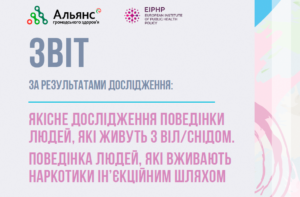A report authored by our experts has been published, devoted to the results of a qualitative study of the behavior of people living with HIV/AIDS and the behavior of people injecting drugs, taking into account changes in the current drug scene.
 The study was performed by the European Institute of Public Health Policy on behalf of the ICF Alliance for Public Health.
Based on in-depth interviews with IDUs and their partners, physicians, and social workers, researchers describe behaviors that encourage or prevent PLHIV from the highest risk groups practicing safe sexual and injecting behaviors to prevent HIV transmission.
The authors separately focus on changes in the modern drug scene – the use of stimulants and new psychoactive substances is spreading in Ukraine. Consumers of synthetic substances often do not associate themselves with “consumers”, do not see the risks and are almost not covered by preventive services.
Researchers provide recommendations for the development of new communication campaigns on IDU: it is necessary to go beyond traditional methods and use all available information channels to provide IDU with up-to-date information about services in a language they understand, involving IDUs in using HIV services.
Kiryazova T., Chernova O., Kornilova M. Qualitative study of the behavior of people living with HIV / AIDS. Behavior of injecting drug users. Alliance for Public Health, 2021 (UA)
The study was performed by the European Institute of Public Health Policy on behalf of the ICF Alliance for Public Health.
Based on in-depth interviews with IDUs and their partners, physicians, and social workers, researchers describe behaviors that encourage or prevent PLHIV from the highest risk groups practicing safe sexual and injecting behaviors to prevent HIV transmission.
The authors separately focus on changes in the modern drug scene – the use of stimulants and new psychoactive substances is spreading in Ukraine. Consumers of synthetic substances often do not associate themselves with “consumers”, do not see the risks and are almost not covered by preventive services.
Researchers provide recommendations for the development of new communication campaigns on IDU: it is necessary to go beyond traditional methods and use all available information channels to provide IDU with up-to-date information about services in a language they understand, involving IDUs in using HIV services.
Kiryazova T., Chernova O., Kornilova M. Qualitative study of the behavior of people living with HIV / AIDS. Behavior of injecting drug users. Alliance for Public Health, 2021 (UA)
